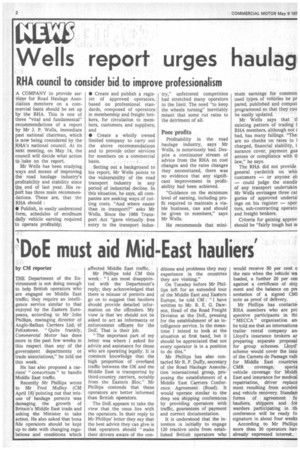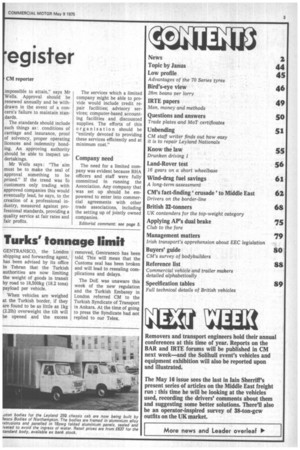Wells report urges haulag egister
Page 4

Page 5

If you've noticed an error in this article please click here to report it so we can fix it.
RHA council to consider bid to improve professionalism A COMPANY to provide services for Road Haulage Association members on a commercial basis should be set up by the RHA. This is one of three "vital and fundamental" recommendations of a report by Mr J. P. Wells, immediate past national chairman, which is now being considered by the RHA's national council. At its next meeting, on May 14, the council will decide what action to take on the report.
Mr Wells has been studying ways and means of improving the road haulage industry's profitability and stability since the end of last year. His report has three main recommendations. These are, that the RHA should : II Publish, in easily understood form, schedules of minimum daily vehicle earning required to operate profitably; • Create and publish a register of approved operators, based on professional standards, composed of operators in membership and freight brokers, for circulation to members, customers and suppliers; and • Create a wholly owned limited company to carry out the above recommendations and to provide other services for members on a commercial basis.
Setting out a background to his report, Mr Wells points to the vulnerability of the road transport industry in any period of industrial decline. In this situation, he says, all companies are seeking ways of cutting costs. "And where easier than in transport?" asks Mr Wells. Since the 1968 Transport Act "gave virtually free entry to the transport indus try," unfettered competition had stretched many operators to the limit. The need "to keep the wheels turning" inevitably meant that some cut rates to the detriment of all.
Poor profits
Profitability in the road haulage industry, says Mr Wells, is notoriously bad. Despite a continuous stream of advice from the RHA on cost changes and the rates changes they necessitated, there was no evidence that any significant improvement in profitability had been achieved.
"Guidance on the minimum level of earning, including profit required to maintain a viable business, can and should be given to members," says Mr Wells.
He recommends that mini mum earnings for common used typea of vehicles be pr pared, published and comput programmed so that they cou be easily updated.
Mr Wells says that ti existing pattern of trading 1 RHA members, although not E bad, has many failings. "The, are no checks on rates to I charged, financial stability, i surance cover, payment gua antees or compliance with tl law," he says.
The RHA did not provide general yardstick on whic customers — or anyone eh — could judge the standir of any transport undertakin Mr Wells envisages three cat gories of approved underta] ings on his register — oper tors, sub-contracting operato and freight brokers.
Criteria for gaining approv should be "fairly tough but ni
impossible to attain," says Mr Wells. Approval should be renewed annually and be withdrawn in the event of a concern's failure to maintain standards.
The standards should include such things as : conditions of carriage and insurance, proof of solvency, proper operating licences and indemnity bonding. An approving authority should be able to inspect undertakings.
Mr Wells says : "The aim must be to make the seal of approval something to be prized." If the trend was to customers only trading with approved companies this would eventually lead, he says, to the creation of a professional industry, measured against professional standards, providing a quality service at fair rates and fair profits. The services which a limited company might be able to provide would include credit repair facilities; advisory services; computer-based accounting facilities and discounted supplies. The efforts of this organisation should be "entirely devoted to providing these services efficiently and at minimum cost."
Company need
The need for a limited company was evident because RHA officers and staff were fully committed in running the Association. Any company that was set up should be empowered to enter into commercial agreements with other trade associations, including the setting up of jointly owned companies.
Editorial comment: see page 5.




























































































































































